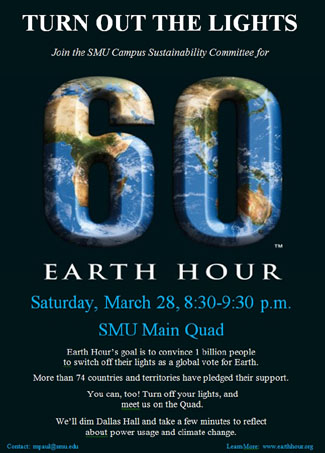SMU Unplugged: Dallas Hall Goes Dark For Earth Hour
SMU takes part in Earth Hour, the global event to underscore an individual’s power to cut energy use.

SMU’s iconic Dallas Hall will go dark Saturday night to mark Earth Hour, the global event to underscore an individual’s power to cut energy use.

“Earth Hour is a significant statement made more powerful by being a global event,” said Bonnie Jacobs, director of SMU’s environmental science and environmental studies programs and associate professor in Dedman College’s Huffington Department of Earth Sciences. “By our participation, SMU is joining thousands of universities and millions of people around the world to say that we recognize how much energy we use collectively, we know the implications, and we want to change for the better.”
Jacobs is a member of SMU’s Campus Sustainability Committee, a group of faculty, staff and students newly formed to evaluate, educate and make recommendations for resource conservation on campus. The committee is sponsoring the SMU Earth Hour event.
Earth Hour began in Sydney, Australia, in 2007 when people in 2.2 million homes and businesses switched off their lights for one hour. In 2008 Earth Hour went global, with 50 million people turning off home lights and dimming landmarks from the Golden Gate Bridge in San Francisco to the Coca-Cola billboard in Times Square. Organizers this year are aiming for 1 billion international participants.
“As a worldwide event, it demonstrates that we are all connected – and that really matters,” Jacobs said.
SMU already is committed to energy use efficiency and resource reduction. For example, Campus Planning and Plant Operations workers have installed motion detectors around campus to automatically shut off unused lights, as well as low-flow sink faucets, efficient showerheads, and waterless urinals to save water. Leadership in Energy and Environmental Design (LEED) buildings certified by the U.S. Green Building Council have become a goal for new construction on campus following the example set by the Embry Engineering Building.
Jacobs advises that individuals can do much more:
- Recycle all paper (including cardboard), metal, #1 and #2 plastic containers and glass. At SMU, clear plastic bags are for recycling, black bags are for trash.
- Refrain from using a tray in the cafeteria when possible.
- Pay attention to packaging – and buy things that use less.
- Turn off and unplug electrical devices when you’re not using them.
- Walk, bike, use public transportation or carpool when you are able.
- Turn off the water while brushing teeth.
- Use your own re-useable containers for water and coffee.
For more information on SMU’s Earth Hour, e-mail mpaul@smu.edu.
###